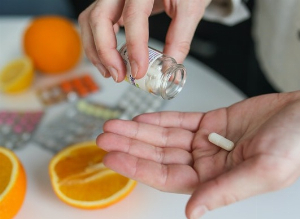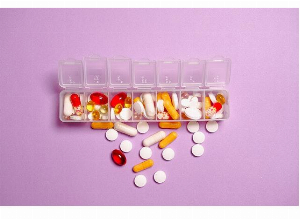Hot weather: risks related to taking certain medications
Published Jun 3, 2022 • By Candice Salomé
In hot weather, some medications can interfere with the body's thermoregulation. In addition, heat can also alter the effectiveness of certain treatments.
What are the possible consequences of insufficient thermoregulation? Which drugs can have a direct impact on the body's thermoregulation? And how can you maintain the effectiveness of your treatments during hot weather?
We explain it all in our article!

How does our body adapt to high temperatures?
In order to function properly, the body must maintain itself within a very specific temperature range. When there is an increase in temperature, the body evacuates the heat through the skin, which is a barrier between the body and the outside world. This process is called thermoregulation.
The higher the temperature, the greater the amount of heat dissipated to enable the body to maintain an adequate temperature.
There are two main mechanisms of heat evacuation:
- Perspiration: sweat glands located under the skin produce sweat which cools the body down by evaporating. In very hot weather, sweat evaporation represents more than ¾ of the body's thermal regulation.
- Simple diffusion (from the surface of the skin to the environment): this phenomenon is intensified by an increase in blood flow thanks to accelerated heart rate and vasodilatation (dilated blood vessels).
Certain groups of people may be more vulnerable in hot weather due to insufficient or impaired thermoregulation:
- Babies and young children,
- Elderly people,
- Patients with certain chronic conditions,
- People who are overweight or obese.
What are the consequences of insufficient thermoregulation?
If the body is unable to maintain a normal working temperature, there is a risk of damage to vital organs such as the liver or brain. The main complications of insufficient thermoregulation are:
- Heat stroke: this can occur when the body is unable to control its own temperature, which rises rapidly. Heat stroke occurs within a few hours. It is a medical emergency, as it can be fatal.
- Heat exhaustion and dehydration: this can occur as a result of a significant loss of water and salts, which is not compensated by sufficient hydration. This syndrome develops a few days after the body has been exposed to high temperatures.
Which drugs can have a direct effect on thermoregulation?
There are drugs that interact with the body's adaptive mechanisms in hot weather and contribute to the aggravation of heat stroke and heat exhaustion.
Some treatments can cause hyperthermia even in normal temperatures, while others can indirectly worsen the effects of the heat.
In addition, certain medications can aggravate the effects of the heat by lowering the blood pressure or altering the person's level of alertness.
Here are some examples of medication that can have an effect on the body's thermoregulation process:
- Drugs such as diuretics, which can cause or worsen dehydration by intensifying water loss from kidneys,
- Non-steroidal anti-inflammatory drugs (NSAIDs), aspirin, certain antihypertensive drugs, antibiotics, anti-diabetics, antivirals, lithium, etc., which can disrupt kidney function,
- Some neuroleptics, treatments for Parkinson's disease, antidepressants that can aggravate existing thermoregulatory problems,
- Drugs that limit the increase in cardiac output, such as beta-blockers,
- Anti-migraine drugs which can sometimes prevent vasodilation or reduce sweating,
- Sleeping pills or anxiolytics that reduce alertness and the ability to adapt one's behavior to be able to deal with heat waves.
Even if these medicines can contribute to aggravating problems linked to heatwaves, you should not stop, reduce or interrupt your treatment without prior medical advice.
If you are taking any of the above medications, make sure you maintain adequate hydration during hot weather by drinking at least 1.5 liters (more than 6 cups) of water per day. Do not hesitate to ask your doctor for advice; he or she will explain what you need to do in order to continue taking your treatment and avoid side effects.
How to store medicine in hot weather?
Before being marketed, medicines are tested to assess their stability in high temperatures. As a result of these tests, three types of medicines have been identified. Their storage conditions, different for each of these three types, are indicated on their packaging.
Medications that should be stored at room temperature
This class of medicines is not affected by heat, even in the case of a heat wave. They can withstand temperatures of up to 104 degrees Fahrenheit for a period of 6 months. There is no need to take special precautions except in extreme conditions (over 104 degrees Fahrenheit).
Medications that should be stored at less than 77 or 86°F
This class of medicines should be stored at moderate temperatures. Nevertheless, too much heat for a few days (or even weeks) will not affect their effectiveness. You can therefore store them in your medicine cabinet without any additional precautions. If you are traveling during a heat wave, it is best to carry them in a non-refrigerated insulated thermal bag.
Medications that must be stored at temperatures between 35,6 and 46,4°F
This class of medicines should be kept in the refrigerator. In the event of a heat wave, it is important to check that the fridge is still able to function normally. Once the medicines have been taken out of the fridge, they should be used up quickly.
If you have to transport them, it is essential to use refrigerated insulated thermal bags or boxes and to make sure that the medicines do not freeze when in contact with the cold source.
Forms of medication that are sensitive to high temperatures
Suppositories may melt in a heatwave. Creams and ointments may also change their texture and appearance.
If you notice a change in the texture or color of your medicines after exposure to heat, it is best not to use them. These changes may indicate a decrease in their effectiveness or a change in their properties.
Give it a "like" and share your thoughts and questions with the community in the comments below!
Take care!
Comments
You will also like

What are the dangers associated with the over-the-counter sale of certain medicines?
Dec 19, 2020 • 6 comments

 Facebook
Facebook Twitter
Twitter

